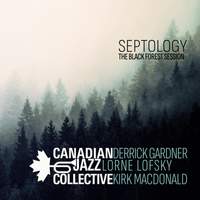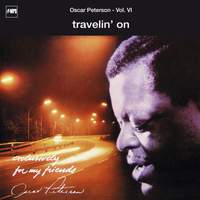Recording of the Week,
Canadian Jazz Collective - Septology: The Black Forest Session

This week, we celebrate the newest arrival on our shores of the best jazz talent from across the pond. Following a string of headline dates last year that culminated in a sold-out performance at Ronnie Scott’s, the Canadian Jazz Collective (CJC) have crystallised the first wave of their outfit’s adventure in the form of a debut album, Septology: The Black Forest Session.
Before diving into the music, however, it would be a shame not to explore the backdrop that lends this recording the gravitas that makes it such a heady contender. We begin with the CJC’s decision to lay down this session at the famed home-studio of the late MPS Records founder, Hans Georg Brunner-Schwer. Located in the southern German city of Villingen, the studio lies just to the east of the Black Forest that gives this album its name. This environment indeed has a rich and deserved history in the Canadian jazz hall of fame; it once served as the location for the recording of Oscar Peterson’s intimate series of concerts from the 1960s, released under the name Exclusively for My Friends. With these recordings, Brunner-Schwer launched the first jazz label in Germany, and the rest, as they say, is history. What better way, then, to inaugurate this exciting new project than in the same venue that housed Peterson’s fabled performances, featuring none other than co-leader, Lorne Lofsky – himself, previously a veritable member of the Oscar Peterson Quartet during the nineties.

On to the album proper, a record comprising eight original tunes individually penned by the group’s three frontmen and co-leaders: Lofsky; trumpeter/flugelhornist Derrick Gardner and saxophonist Kirk MacDonald. Blending their respective voices into one coordinated style, you can tell from the get-go that the collective have not come to mess around. Opening number, ‘Dig That’, commences with a staunch melody that begins on the upbeat of the whole record, a deep hard-bop groove reminiscent of Art Blakey’s Jazz Messengers that would not appear out of place amongst any of the aforementioned group’s classic recordings. The band’s collective experience enables the frontline to soar above the super-tight rhythm section, which consists of pianist Brian Dickinson, Neil Swainson on double bass and Bernd Reiter, behind the kit.
Each member of the collective is well-versed in their musical vocabulary and it shows. It is clear that talent runs in the MacDonald family, as the ensemble is complemented by the virtuosic stylings of clarinettist Virginia, who, along with her father, delivers soulfully-refined soli and accompaniment throughout. As suggested, there is a deep familial tie not just in terms of membership but of sound as well, since the individual players’ lexicon spans many solid musical references to jazz history: ‘Waltz You Needn’t’ carries a head that knowingly touches on Monkian elements of rhythmic and tonal colour, as the title implies. At the top of his solo, Gardner quotes the Neapolitan earworm, ‘Funiculì, funiculà’, in a moment full to the brim with lydian cheek. Lofsky drops in a lick from ‘Rhapsody in Blue’ as he skilfully clambers up and down the bluesy changes. ‘Silent Voices’ is a much shadier affair – one that always asks one more question than it is willing to answer – that offers a notably captivating solo from Swainson, accompanied solely by the lone rumble of soft mallets. Dickinson’s comping is dazzlingly creative and appropriate for each of the moods he and his fellow rhythm players conjure up, from the heated double-time energy of ‘Terre de DuSable’, to the laid-back mellowness of ‘Highway 9’.
What strikes the listener is the superlative balance of textures between soloist and ensemble. Not one element of this musical refreshment is over-seasoned. Another refreshingly precise component of the CJC is how the album’s flow is never interrupted by self-conscious turn-taking – neither predictable, nor abrupt – but rather plays out in a formal yet exploratory manner. Any one of these tunes possesses the qualities of a future standard, which just goes to show how coherent the ensemble’s overall calibre is for piecing a chart together. If this is the beginning of Canada’s premier jazz establishment, I strongly anticipate what the future holds in store for them.
Available Format: Vinyl Record
Available Formats: MP3, FLAC, Hi-Res FLAC





